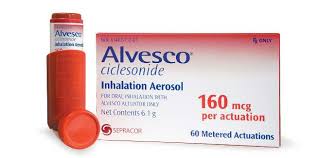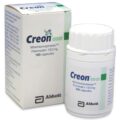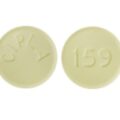Asthma is a condition in which your airways narrow and swell and may produce extra mucus. This can make breathing difficult and trigger coughing, a whistling sound (wheezing) when you breathe out, and shortness of breath. For some people, asthma is a minor nuisance.
What is Alvesco?
Alvesco is a brand-name prescription medication. It’s FDA-approved to help prevent symptoms of asthma in adults as well as children ages 12 years and older. (This is known as “maintenance treatment.”) You should not use Alvesco to treat asthma attacks or sudden trouble breathing. Alvesco is a type of corticosteroid medication. The active drug in Alvesco is called ciclesonide. Alvesco comes as an aerosol inhaler, which releases a fine spray of medication into your lungs when you take a dose.
The drug is not a rescue inhaler. Alvesco eases swelling in airways over time, which may lead to fewer and less severe asthma attacks. However, the drug won’t work to stop an asthma attack that’s already occurring. (For more information, see the “Alvesco uses” section below.)
Alvesco is available in two strengths: 80 micrograms (mcg) and 160 mcg per dose. How often you use Alvesco depends on what other medications you’re taking or have taken to treat your asthma. To learn more, see the “Alvesco dosage” section below.
Is Alvesco generic now Available?
Alvesco is available only as a brand-name medication. It’s not currently available in generic form. A generic drug is an exact copy of the active drug in a brand-name medication. Generics usually cost less than brand-name drugs. The most common version of Alvesco is covered by 77% of insurance plans at a co-pay of $15.00-$75.00, however, some pharmacy coupons or cash prices may be lower.
Alvesco side effects
Alvesco can cause mild or serious side effects. The following lists contain some of the key side effects that may occur while taking Alvesco. These lists do not include all possible side effects.
For more information about the possible side effects of Alvesco, talk with your doctor or pharmacist. They can give you tips on how to deal with any side effects that may be bothersome.
Note: The Food and Drug Administration (FDA) tracks the side effects of drugs it has approved. If you would like to notify the FDA about a side effect you’ve had with Alvesco, you can do so through MedWatch.
Mild side effects
Mild side effects of Alvesco can include*:
- headache
- nasal congestion (stuffy nose)
- sore throat
- upper respiratory infection, such as a sinus infection
- joint pain
- back, arm, or leg pain
- swelling in the nose or throat
- sinusitis (swelling of the sinuses)
- cough
- oral thrush† (a type of fungal infection in your mouth).
Most of these side effects may go away within a few days or a couple of weeks. But if they become more severe or don’t go away, talk with your doctor or pharmacist.
* This is a partial list of mild side effects from Alvesco. To learn about other mild side effects, talk with your doctor or pharmacist, or refer to Alvesco’s Patient Information.
Serious side effects
Serious side effects from Alvesco aren’t common, but they can occur. Call your doctor right away if you have serious side effects. Call 911 or your local emergency number if your symptoms feel life-threatening or if you think you’re having a medical emergency.
Serious side effects and their symptoms can include:
- An increased level of a hormone called cortisol in your blood. Symptoms can include:
o weight gain
o skin that bruises easily
o acne
- Increased risk of infection, such as a bacterial infection. Symptoms can include:
o fever
o chills
o nausea or vomiting
o fatigue (lack of energy)
- Decreased bone mineral density (weakened bones). Symptoms can include:
o back pain
o breaking a bone more easily than expected
- Bronchospasm (wheezing or trouble breathing that gets worse), which occurs right after taking a dose of Alvesco. Symptoms can also include:
o chest tightness
- Allergic reaction.*
- Eye conditions,* such as glaucoma.
Side effects in children
It’s possible that children* taking inhaled corticosteroids such as Alvesco may not grow as much as they should. However, clinical trials haven’t shown a difference in other side effects that occur in children and those that occur in adults. (To learn more, see “Alvesco side effects” above.)
* Alvesco is approved for use in children ages 12 years and older.
Stunted growth in children
In clinical studies, children taking inhaled corticosteroids such as Alvesco grew about 0.39 inches (1 centimeter) less than children not taking the drugs. Children taking higher doses of inhaled corticosteroids over longer periods had the largest change in growth.
It’s not known how much Alvesco can affect a child’s growth. It’s also not known if children may experience “catch up” growth after stopping Alvesco treatment. (This height increase would make up for the growth that didn’t occur while using the drug.)
Your child’s doctor will monitor their height throughout treatment with Alvesco. If the doctor believes that the drug is affecting your child’s height, they may recommend a different type of asthma medication.
Your child’s doctor will also typically prescribe the lowest possible dose of Alvesco that’s effective in treating your child’s asthma. This should help decrease any side effects your child has.
Side effect details
You may wonder how often certain side effects occur with this drug or whether certain side effects pertain to it. Here’s some detail on certain side effects this drug may or may not cause in adults.
Allergic reaction
As with most drugs, some people can have an allergic reaction after taking Alvesco.
Allergic reactions involving swelling of the mouth, lips, or tongue have been reported in people taking Alvesco. However, it’s not known how many people taking the drug may have experienced this side effect. Alvesco wasn’t compared with other medications to study allergic reactions. So it’s not known how many people taking other medications may have also experienced an allergic reaction.
In general, symptoms of a mild allergic reaction can include:
- skin rash
- itchiness
- flushing (warmth and redness in your skin)
A more severe allergic reaction is rare but possible. Symptoms of a severe allergic reaction can include:
- swelling under your skin, typically in your eyelids, lips, hands, or feet
- swelling of your tongue, mouth, or throat
- trouble breathing
Call your doctor right away if you have an allergic reaction to Alvesco, as the reaction could become severe. Call 911 or your local emergency number if your symptoms feel life-threatening or if you think you’re having a medical emergency.
Oral thrush
During Alvesco treatment, oral thrush may occur in adults and children. This is a type of fungal infection in the mouth caused by a fungus called Candida albicans. In clinical trials, more than 3% of people taking Alvesco developed oral thrush in their mouth. Alvesco was compared with a placebo, but it’s not known how many people taking a placebo may have also developed oral thrush. (A placebo is a treatment with no active drug in it.)
Symptoms of oral thrush
Symptoms of oral thrush may include:
- white spots in your mouth
- decreased ability to taste
- pain or burning in your mouth
If you develop symptoms of oral thrush while taking Alvesco, talk with your doctor. They can recommend a medication for it. In most cases, you’ll be able to keep using Alvesco while you’re having treatment for oral thrush. But sometimes, your doctor may have you stop your treatment with Alvesco until the oral thrush has gone away. It’s possible to help prevent oral thrush. After using your Alvesco inhaler, gargle and rinse out your mouth with water, then spit the water out. This helps decrease your risk of developing oral thrush. If you have questions about preventing oral thrush, talk with your doctor.
Eye conditions
Certain eye conditions may occur with Alvesco. These include:
- increased eye pressure
- glaucoma (a type of eye disease that’s the result of increased eye pressure)
- cataracts (cloudiness or blurring of the lens of your eye)
In clinical trials, eye conditions were reported in people using either Alvesco or other inhaled corticosteroids. (Alvesco is a type of corticosteroid.)
The trials showed that minor changes in eye pressure or vision occurred in:
- 36.1% of people using Alvesco
- 38.4% of people using another inhaled corticosteroid
The trials also showed that more serious changes in eye pressure or vision occurred in:
- 8.1% of people using Alvesco
- 9.2% of people using another inhaled corticosteroid
The most serious changes in eye pressure or vision occurred in:
- 0.9% of people using Alvesco
- 0.5% of people using another inhaled corticosteroid
If you have a history of these eye disorders or notice any changes in vision while you’re using Alvesco, be sure to tell your doctor. They will probably recommend a vision test. If you do develop changes in your vision, your doctor may monitor your eyes more often than usual. Or they may switch you to a different medication to treat your asthma.
Anxiety (not a side effect)
Anxiety isn’t a side effect reported by people taking Alvesco.
However, another type of drug that may be used to treat asthma called a bronchodilator,* may cause anxiety and nervousness. Bronchodilators open up your airways to allow more air into your lungs. In some cases, your doctor may recommend that you use a bronchodilator* along with Alvesco.
Examples of bronchodilators include:
- albuterol (ProAir, Ventolin HFA, Proventil)
- levalbuterol (Xopenex)
- tiotropium (Spiriva)
- umeclidinium (Incruse Ellipta)
If you’re experiencing anxiety, talk with your doctor. They may be able to help determine what’s causing the anxiety and the best way to treat it.
* Certain bronchodilators come in the form of rescue inhalers. To learn more about using Alvesco with a rescue inhaler, see the “Alvesco use with other drugs” section below.
Weight gain (not a side effect)
Weight gain wasn’t a side effect that was reported in clinical trials of people taking Alvesco.*
However, corticosteroid medications that are taken orally (by mouth) may cause weight gain. In some cases, you may take these drugs with Alvesco. They’re also known as “oral steroids.”
Examples of oral steroids include:
- prednisone (Rayos)
- methylprednisolone (Medrol)
- dexamethasone (Decadron)
If you notice an unexpected weight gain while using Alvesco, talk with your doctor. They may be able to help determine the cause, as it typically won’t be Alvesco. Your doctor may also be able to recommend ways for you to manage your weight.
* Alvesco is an inhaled corticosteroid.
Alternatives to Alvesco
Other drugs are available that can treat your condition. Some may be a better fit for you than others. If you’re interested in finding an alternative to Alvesco, talk with your doctor. They can tell you about other medications that may work well for you.
Alternatives for asthma
There are many different types of medications that may be used to treat your asthma. In some cases, a combination of drugs may be used.
Below are examples of other inhaled medications that your doctor may recommend to treat your asthma:
- fluticasone propionate (Flovent, Xhance)
- fluticasone furoate (Arnuity Ellipta)
- beclomethasone (Qvar)
- mometasone (Asmanex)
- budesonide (Pulmicort, Rhinocort)
- albuterol (ProAir, Ventolin HFA, Proventil)
- levalbuterol (Xopenex)
- tiotropium (Spiriva)
- umeclidinium (Incruse Ellipta)
- ipratropium (Atrovent HFA)
- fluticasone/salmeterol (Advair HFA, Advair Diskus)
- budesonide/formoterol (Symbicort)
- formoterol/mometasone (Dulera)
There are also some oral medications, which are taken by mouth, to treat asthma. They include:
- montelukast (Singulair)
- theophylline (Theo-24, Theochron)
- prednisone (Rayos)
- methylprednisolone (Medrol)
- dexamethasone (Decadron)
- zafirlukast (Accolate).





